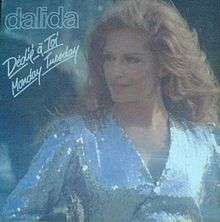Dédié à toi (Monday Tuesday)
| Dédié à toi (Monday Tuesday) | ||||
|---|---|---|---|---|
 | ||||
| Studio album by Dalida | ||||
| Released | 1979 | |||
| Recorded | 1979 | |||
| Genre | World music, Pop music, Disco, Adult contemporary music | |||
| Label | Orlando International Shows, Carrere | |||
| Dalida chronology | ||||
| ||||
Dédié à toi (Monday Tuesday) is a French studio album released by Dalida in 1979.
Background
In this album, Dalida sings once more Jacques Brel's "Quand on n'a que l'amour", considered one of her best covers. She also remembers her late lover Luigi Tenco through a cover of one of his masterpieces, "Vedrai vedrai". It includes her smashing hit "Monday, Tuesday... Laissez-moi danser", and a patriotic homage to her birth country Egypt, "Helwa ya balady".
The album proved to be one of Dalida's most successful albums of the seventies, selling millions of records.
Track listing
- "Dédié à toi"
- "The Lambeth Walk" (English)
- "Va, va, va"
- "Quand on n'a que l'amour"
- "Helwa ya balady"
- "Vedrai vedrai"
- "Comme disait Mistinguett"
- "Problemorama (L'argent... l'argent...)"
- "Monday, Tuesday... Laissez-moi danser"
- "Depuis qu'il vient chez nous"
Track listing (2nd version)
- "Dédié à toi"
- "Vedrai vedrai"
- "The Lambeth Walk" (English)
- "Quand on n'a que l'amour"
- "Helwa ya balady"
- "Monday, Tuesday... Laissez-moi danser"
- "Va, va, va"
- "Problemorama (L'argent... l'argent...)"
- "Depuis qu'il vient chez nous"
- "Comme disait Mistinguett"
Singles
- "Le Lambeth Walk... C'était pas compliqué"
Le Lambeth Walk is an old melody from the 1940s and released by Dalida as a single 1978, before the album's release. The TV performances of the song were done in a retro style with a dance routine. The song released at the end of 1978 was very successful and received a gold certification securing Dalida's presence in the charts between 1978 and 1979. Only the English version of the song is presented on the album.
After the immense success that Dalida gained through the release of her first Arabic song "Salma Ya Salama", Jeff Barnel wrote her another masterpiece, this time a ballad hymn dedicated to her home country, Egypt, which she released in 1979. The song plays on emotions felt once a person leaves his home country and is homesick, thus making the song a huge hit for Dalida in the Middle East and especially in Egypt where the single became a best seller and earned gold certification. The single went to number one in all the Arabic speaking countries becoming a classic and helped Dalida gain the hearts of millions of Arabs who considered her one of their biggest Divas. Dalida went on tour in the Middle East to promote her new single and the public stood on chairs in her concerts asking her to perform the song up to three times in a row.
- "Problemorama" / "Depuis qu'il vient chez nous"
"Problemorama" was well promoted by Dalida on French and Belgian television. It reached the top 20 charts. Coupled to this song is a ballad that talks about a woman who discover the bisexuality of her husband. Dalida is once more a pioneer in that area as she respects each person's sexual choices and says so in many interviews thus gaining a huge gay following that will grow bigger and bigger over the years.
Released in 1979, This song is inspired by The Village People disco style where a chorus of men is singing the verse with Dalida. Originally a song by Toto Cutugno that Orlando (the producer and brother of Dalida) adapted to French with the help of French song writer Pierre Delanoé. An English version was also created under the title "Let Me Dance Tonight". The song was released and performed on TV with a dance routine that sees Dalida surrounded by various types of young men dancing and singing the catchy lyrics and verses of the song.
The song was an immediate hit both on TV, in the charts, on radio stations and especially in the clubs where Dalid became the reigning queen. The song was released to high success in France where it topped the charts for months. Both French and English versions of the song were also released as singles in Europe and Asia. The record went gold and then platinum by the end of its run and is one of the most successful songs of Dalida's career. It is considered today as one of her signature disco tracks.
References
- L’argus Dalida: Discographie mondiale et cotations, by Daniel Lesueur, Éditions Alternatives, 2004. ISBN 2-86227-428-3 and ISBN 978-2-86227-428-7. (French)